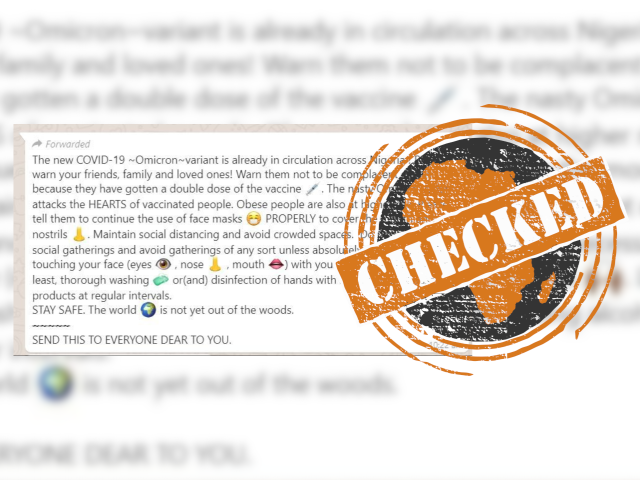Garden eggs – a type of eggplant – and cucumbers washed down with an infusion of okra on an empty stomach is a remedy for high blood sugar, claims a message posted on Facebook in Nigeria.
“The appropriate blood sugar level is between 75 to 110,” it reads. “Once you have a higher reading that is above 120, then it is possible you start to experience the followings, which is a sign that you are Diabetic, and may eventually means you have Diabetes.”
It then describes the remedy’s preparation process, advising people to “do this for 21 days and before the 21 days you can constantly check your sugar level so that it won't go down more than the acceptable level”.
Hyperglycemia or high blood sugar can affect people with type 1 and type 2 diabetes, and occasionally people without diabetes. It’s potentially dangerous if blood sugar levels become very high or stay high for long periods.
Extremely high blood sugar levels can cause life-threatening complications, such as diabetic ketoacidosis and a form of severe dehydration known as hyperosmolar hyperglycaemic state.
But will this preparation treat high blood sugar? And what is the body’s “appropriate sugar level”?

No scientific evidence for remedy
We asked Aihanuwa Eregie, a professor of medicine and endocrinology at the University of Benin in southwestern Nigeria, about the Facebook post.
“I am not aware of any scientific data that proves taking this will lower the blood sugar,” she said. “But there are things we recommend as part of a healthy diet.” A healthy diet can help control blood sugar levels, she explained.
Eregie added that the claim that the “appropriate” blood sugar level was between 75 milligrams per decilitre (mg/dL) and 110 mg/dL was misleading, as blood sugar varies depending when the blood sample was taken, such as while fasting, after a meal, or some other time of day.
“Depending on the lab, fasting sample results within a range of 70 to 109 mg/dL is considered normal,” she said.
“Any value from 110 to 125 mg/dL is prediabetes, anything greater than 126 mg/dL is taken as diabetes. A sample taken about two hours after a meal should not return levels greater than 140 to 160 mg/dL. If the level is persistently above 200 mg/dL, then the person has diabetes."
Republish our content for free
For publishers: what to do if your post is rated false
A fact-checker has rated your Facebook or Instagram post as “false”, “altered”, “partly false” or “missing context”. This could have serious consequences. What do you do?
Click on our guide for the steps you should follow.
Publishers guideAfrica Check teams up with Facebook
Africa Check is a partner in Meta's third-party fact-checking programme to help stop the spread of false information on social media.
The content we rate as “false” will be downgraded on Facebook and Instagram. This means fewer people will see it.
You can also help identify false information on Facebook. This guide explains how.





Add new comment